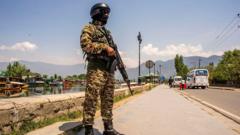Pakistan's information minister, Attaullah Tarar, announced that the country possesses "credible intelligence" suggesting that India is poised to carry out a military strike in the next 24 to 36 hours. This announcement follows India’s accusation that Pakistan is supporting militants responsible for a tragic attack in Indian-administered Kashmir, which claimed the lives of 26 tourists last week. Pakistan has vigorously denied these allegations.
Tarar stated that India plans to use the recent attack as a "false pretext" for military action. He cautioned that any military aggression from India would provoke a "decisive" response from Pakistan. In recent days, there have been exchanges of small-arms fire along the border, contributing to the rising tensions.
The attack near Pahalgam was the deadliest civilian incident in Kashmir in twenty years and has intensified speculation about whether India might respond with military strikes, similar to its actions following attacks in 2016 and 2019. In parallel, Indian authorities have escalated security operations in the region, detaining over 1,500 people for questioning and demolishing the homes of several alleged militants.
Although the identity of the attackers remains largely unconfirmed, initial reports linked a little-known group, the Resistance Front, to the assault, though the group has since denied involvement. Indian authorities have identified three of the four attackers—two believed to be Pakistani nationals and one from Kashmir—while details on the fourth remain scarce.
As the situation develops, outrage continues to grow in India, with Prime Minister Narendra Modi vowing to pursue the assailants relentlessly, promising severe consequences for those involved. The historical frictions over Kashmir, a region both countries claim, are becoming increasingly pronounced amidst this recent flare-up.



















